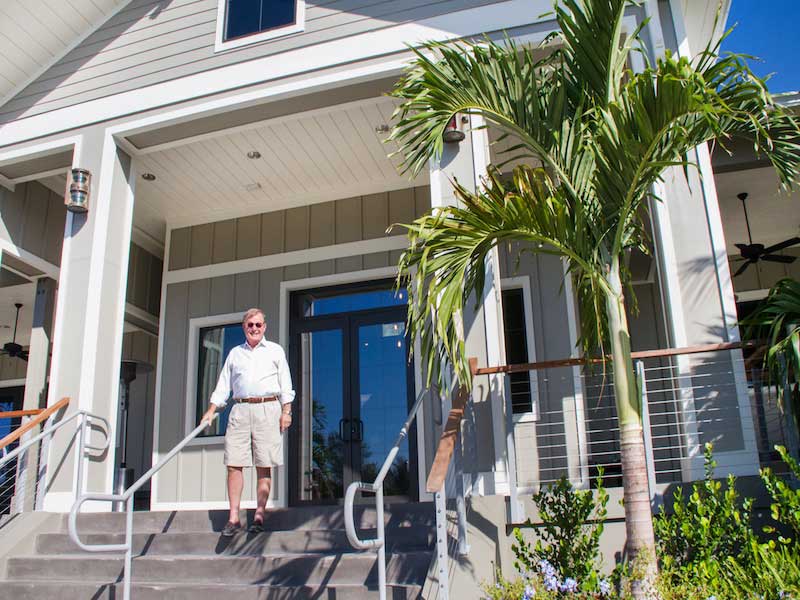If you’ve ever met the man, odds are he’s greeted you like a long lost friend and put a big smile on your face. That’s Marty Harrity, highly successful Southwest Florida restaurateur and one dynamic personality who truly lights up a room.
A resident of Sanibel for 25 years now, Harrity parlayed a career in sales and marketing for national brands — as well as ownership of one of the first mylar balloon manufacturing companies in the U.S. — into relocation to the islands and an early retirement at the age of 42 that, as he laughs, “lasted about seven days.”
Today, through connections, a lot of hard work and opportunities, Harrity and his associates own and lead the very successful Doc Ford’s restaurants on Sanibel, Captiva and Fort Myers Beach, along with the Beached Whale and Dixie Fish House, also of Fort Myers Beach.
But to hear Marty Harrity tell it, success in the restaurant business isn’t just about food, but — as in life — it’s about people and how you treat them, as well as community and how you give back.
Each issue, “Take Five” poses five questions to a community leader or personality that have not been previously shared. Here, Marty Harrity dishes on the success of his restaurant franchises, as well as his passion to help others succeed and grow.
View this story online via our digital issue here.
1. Who was the genius behind the Doc Ford’s concept?
Randy Wayne White was really the original genius. In 2003, our restaurant at Rabbit Road called the Island House wasn’t doing very well. We knew we had to change the format. At a meeting with my wife and others it was suggested we call Randy White. At the time, the only Randy White I knew used to play for the Dallas Cowboys (laughs). Anyway, the next day we met, and I learned that Randy already had a restaurant concept called Doc Ford’s — and boom, the rest is history.
2. Were you surprised at the quick success of Doc Ford’s?
Yeah, I was. With the Beached Whale, it was already an existing restaurant so our success and growth there wasn’t too surprising. Here, we took a failing concept and brought in something totally new, and in the process, between the mistakes and the investments and the launch, I probably learned enough to earn a Harvard Business School degree! We’ve been fortunate, but we’ve always had a great team.
3. What do you think is the key to your success?
People. People. People. People. People. People. Treat your people right, they’ll get up in the morning and want to come to work, and how good is that for your business? Sure, we have great chefs and a great menu, but it’s about hospitality. We treat our people with respect and appreciation for what they do, because if they’re successful, guess what, we’ll be successful. We treat our customers the same way: thank you for choosing to spend your money with us, I hope we’ve exceeded your expectations.
4. What are your plans for the future, what are you working on next?
Every day I wake up thinking about stuff, but one of the things I’ve learned over the years is I don’t take anything for granted. Just because I’ve opened a few restaurants that have been successful doesn’t mean the next one will be. I’ll spend years of research looking at a location, analyzing the demographics and being cautious. I’m always looking for opportunities, but I also need the people. So we spend a lot of time and money training our people to move up when the time is right.
5. You don’t seem like someone who wants to slow down.
I’m 68 years old and I don’t know how to slow down. I love building teams. If I see an opportunity to put people together and create something, well, that’s what I like to do. Slow down? Nah, not in my crosshairs.
Story by John Sprecher | Photography by Milissa Sprecher

